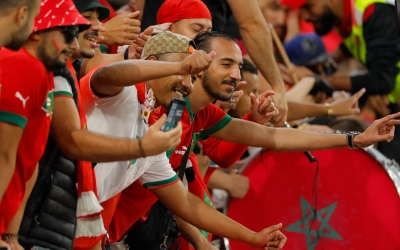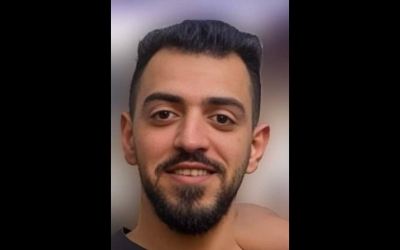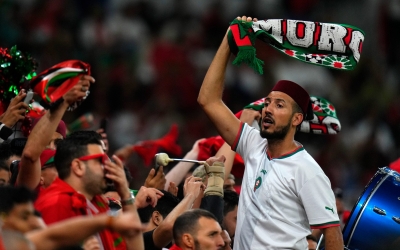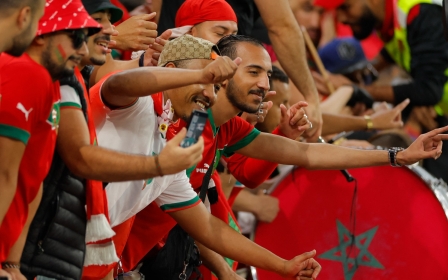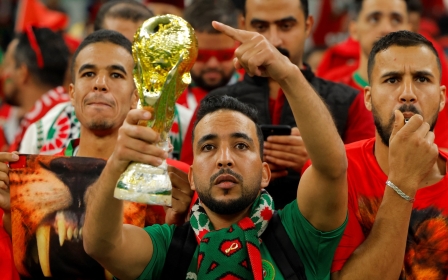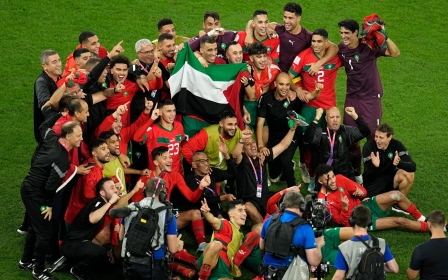Club World Cup: Hosts Morocco seek to impress Fifa after heroics in Qatar
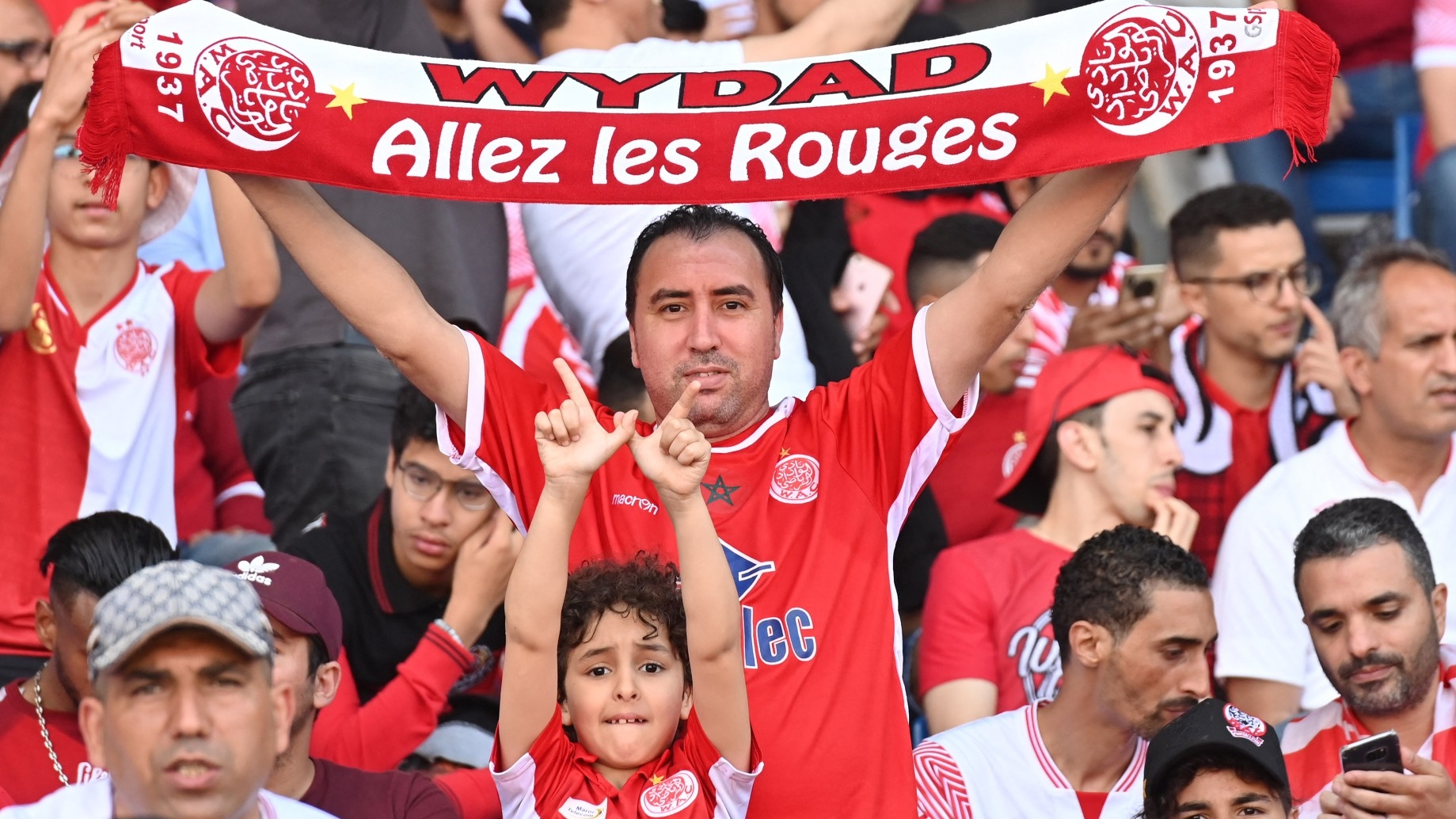
Less than two months after Morocco's exceptional run at the Qatar World Cup, the North African nation finds itself at the heart of world football again as it plays host to the Club World Cup.
Starting on Wednesday and running until 11 February, the Moroccan capital Rabat and the northern port city of Tangier will host a series of matches featuring winning clubs from Brazil, Egypt, New Zealand, Saudi Arabia, Spain, the United States and Morocco itself.
The opening game will take place between Al Ahly and Auckland City in Tangier, but Moroccan fans are most excited about the 4 February clash in Rabat between Saudi Arabia's Al Hilal and Wydad AC, Morocco's best-known club.
'Our infrastructure will need improvement in the coming six years to be ready to host an event at the scale of the World Cup'
- Idir Moukhlis, Wydad AC fan
Tickets for that match and other high-profile games sold out within hours of going on sale on 20 January, leading to frustration among fans. Some even took to Reddit to find tickets.
Idir Moukhlis, a project manager and Wydad fan in the Middle Atlas city of Ifrane, intends to catch the Club World Cup on TV after missing out on the chance to buy tickets.
New MEE newsletter: Jerusalem Dispatch
Sign up to get the latest insights and analysis on Israel-Palestine, alongside Turkey Unpacked and other MEE newsletters
"I feel a sense of pride, especially since Wydad qualified as the champion from the African continent and not as a team of the host country," he told Middle East Eye.
"I really hope they progress as far as possible in the tournament, and why not win on home soil?"
A Moroccan club has never won the Club World Cup; the closest one came was when Raja Casablanca were runner-up a decade ago.
Even so, Morocco has history with the tournament - the kingdom has played host twice before, in 2013 and 2014.
Fans' scepticism
Moroccan fans hope that a smooth Club World Cup could boost Morocco's credentials to host the World Cup itself in 2030.
Among them is Souhaila Adrif, a Wydad supporter and journalist covering today's match for Le Journal de Tanger.
"The Club World Cup and its success is a strong indicator that strengthens Morocco's position and its ability to host the World Cup in 2030, especially after the Lions’ victories in Qatar," she said.
Other fans, however, remain sceptical after the failure of the kingdom's five previous World Cup bids.
"We have enough stadiums, but our infrastructure will need improvement in the coming six years to be ready to host an event at the scale of the World Cup," Moukhlis told MEE.
In 2018, Fifa inspectors visited Morocco to evaluate its suitability as a host for the 2026 World Cup. Their report raised questions about the ability of Morocco’s airports and trains to ferry fans between a dozen cities designated to host matches.
The primary form of public transport to two of those cities, Nador and Oujda, is a twice-daily train that makes the 10-hour commute from Casablanca, Morocco's largest city and home to its main international airport.
Not quite ready
Maddie August, an American architect in the inland city of Fes, who plans to attend a Club World Cup match in Tangier, took a train to Nador last year.
"The overnight train was certainly an experience," she said. "Leaving Fes at 2am and stumbling into Nador at 8am was exhausting and cold, and felt very much not worth it."
Three of Morocco's proposed cities for the 2026 World Cup - Agadir in the south, Ouarzazate in the south-central belt, and Tetouan in the north - lack passenger trains altogether. Nonetheless, Morocco has made some major improvements to its infrastructure in recent years.
In 2018, the kingdom launched Africa's first bullet train, Al Boraq. The train cut the trip from Rabat to Tangier from over five hours to an hour and 20 minutes. At the same time, the Fifa report expressed scepticism that Morocco could extend Al Boraq to Marrakech and Agadir by its self-imposed deadline of 2025.
Jasper Branckaerts, a Belgian studying Arabic in Tangier, reflected on these challenges as he prepared to attend the Club World Cup's opening match on Wednesday.
"I think the World Cup is an event of another degree," he told MEE. "It's more like a natural disaster. Almost every eye of the world looks in the direction of the World Cup, even if you're not interested in sports at all.
"I'm uncertain if Morocco has - at least right now - the capacity to give what is necessary to uphold that standard."
Political problems
The kingdom has plenty of reasons to worry about prying eyes. Qatar's winning bid for the 2022 World Cup invited condemnation of the Gulf monarchy’s dubious record on freedom of speech, gay rights, labour rights, and even the sale of alcohol.
Morocco would face many of the same issues if it were chosen as the 2030 host. A second Fifa report on the Moroccan bid for the 2026 World Cup cited "unexplored risks" stemming from Morocco’s approach to human rights, and in particular gay rights.
Morocco's diplomatic stances could likewise undermine its standing as a potential host. In the past, African countries such as Namibia and South Africa have opposed the kingdom’s World Cup bids because of its claim to Western Sahara.
"The opposition of these countries is political and has nothing to do with sports," argued Adrif, the journalist in Tangier.
"These countries are known for their support for the agenda of neighbouring Algeria, which aims to divide Morocco and deprive it of an essential piece of its body, Moroccan Sahara."
At times, the Moroccan bids themselves have become sources of controversy.
A 2015 investigation by The Sunday Times suggested that while Morocco's 2010 World Cup proposal won the most votes, Fifa awarded the tournament to South Africa after some unspecified intrigue. Both countries faced accusations of distributing bribes to Fifa officials, but rejected the charges.
Morocco has had to deny allegations of bribing Fifa officials several times, going all the way back to its 1998 World Cup bid.
Animal welfare concerns
Last month, Morocco’s decades-long World Cup saga took its latest bizarre turn.
On 26 January, Morocco World News reported that Tangier authorities had begun culling stray dogs in advance of the Club World Cup. Four days later, The Daily Beast released a gruesome video of a campaign that, by that point, had claimed the lives of hundreds of dogs.
The Daily Beast linked the policy to the impending arrival of Fifa inspectors reviewing Morocco’s bid for the 2030 World Cup.
"To witness such cruelty take place in Tangier and in 2023 is unfathomable," said Hajar Laarichi, a Wydad fan in Casablanca.
"I lived in Tangier for six years and saw how dogs coexisted with humans. For that to be completely dismissed to host a football event for 10 days clearly shows that Morocco’s interests are in the wrong place.”
In 2018, the news media highlighted a similar incident tied to Fifa's inspection that year. Locals alleged that Moroccan authorities killed dozens of dogs in the resort towns of Aourir, Tamraght and Taghazout, which neighbour Agadir.
Could Algeria be the answer?
Amid these scandals and obstacles, Morocco's best hope for hosting the 2030 World Cup may come from an unlikely place: Algeria, its rival on and off the football pitch.
Despite historical tensions between Algeria and Morocco over Western Sahara, in 2018 Algiers hinted at its willingness to launch a joint bid for the 2030 World Cup with Morocco and Tunisia.
Some experts have endorsed this idea as a way to address Fifa’s concerns about Morocco’s infrastructure, and Moroccans themselves may share this enthusiasm.
Last month, the Arab Barometer released the results of a poll showing that a majority of Moroccans favour reopening their country’s borders with Algeria, an indication of warm ties between the two peoples.
Zakaria Hatimi, a student in the commuter city of Sale, who is set to attend Wydad's faceoff with Al Hilal on 4 February, supports the proposal for a joint bid.
"Morocco, Algeria and Tunisia are like one country," Hatimi told MEE. "We have the same traditions and lifestyle, and our union is power."
Middle East Eye delivers independent and unrivalled coverage and analysis of the Middle East, North Africa and beyond. To learn more about republishing this content and the associated fees, please fill out this form. More about MEE can be found here.


